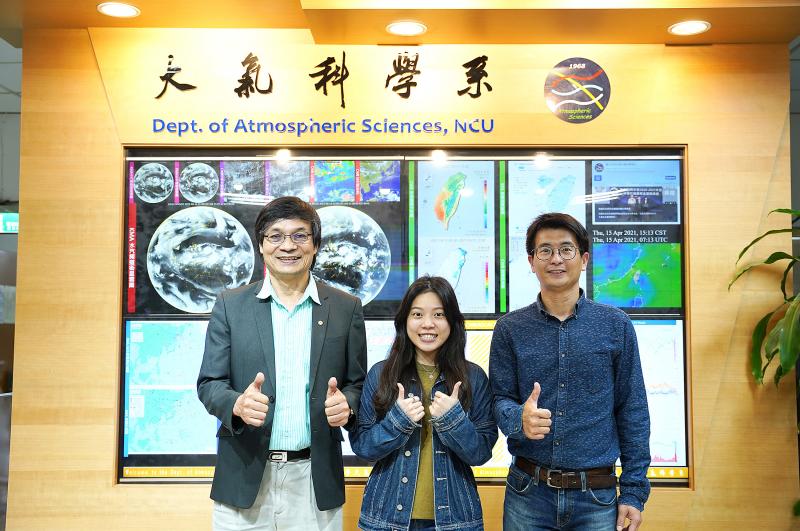New research suggests that air pollution indirectly reduces the amount of rainfall in northern Taiwan during autumn, which might have exacerbated the water shortage at New Taipei City’s Shihmen Reservoir (石門水庫).
Researchers from National Central University (NCU) and the State University of New York at Albany analyzed 13 years of satellite and surface data for the study, which was published on March 23 in the journal Atmospheric Chemistry and Physics.
Taiwan receives most of its annual rainfall from May to September during the plum rain and typhoon seasons, NCU Department of Atmospheric Sciences associate professor Wang Sheng-hsiang (王聖翔) said.

Photo courtesy of National Central University
Although there is relatively less rainfall during fall and winter, it is key to maintaining reservoir levels, Wang said.
However, it is also when pollution tends to be most severe, which not only affects health, but can also affect the characteristics of rain droplets, he added.
Researchers analyzed data from 2005 to 2017 on concentrations of PM2.5 — airborne particulate matter smaller than 2.5 micrometers — meteorological parameters, such as wind direction and temperature, raindrop size, aerosols and cloud properties, to determine the effect that aerosols might have on clouds and drizzle during autumn over northern Taiwan.
They found that in the densely industrialized northwest, the season is mainly dominated by warm, thin and broken clouds, which are defined as having an internal temperature of at least 0°C.
Aerosols were discovered to have an indirect effect on the clouds, meaning that as aerosol concentrations rose, cloud droplets became smaller and more numerous, with drizzles occurring less frequently.
The data also reflected this, as “polluted” days saw about 6.8mm less daily average rainfall than “clean” days, with polluted days defined as the 80th percentile of daily average PM2.5, while clean days fell in the 20th percentile.
Lead author of the study, Chen Ying-chieh (陳映潔), obtained a graduate degree from NCU’s Department of Atmospheric Sciences.
As a graduate student, she was in the first cohort of the US-Taiwan Partnership for International Research and Education (PIRE), which sent her on a two-month exchange to the US.
PIRE is run by the Ministry of Science and Technology and the US National Science Foundation through NCU and the State University of New York at Albany. The program aims to promote research collaboration on weather and climate prediction, and emergency response strategies.

A magnitude 5.6 earthquake struck off the coast of Yilan County at 12:37pm today, with clear shaking felt across much of northern Taiwan. There were no immediate reports of damage. The epicenter of the quake was 16.9km east-southeast of Yilan County Hall offshore at a depth of 66.8km, Central Weather Administration (CWA) data showed. The maximum intensity registered at a 4 in Yilan County’s Nanao Township (南澳) on Taiwan’s seven-tier scale. Other parts of Yilan, as well as certain areas of Hualien County, Taipei, New Taipei City, Taoyuan, Hsinchu County, Taichung and Miaoli County, recorded intensities of 3. Residents of Yilan County and Taipei received

Taiwan has secured another breakthrough in fruit exports, with jujubes, dragon fruit and lychees approved for shipment to the EU, the Ministry of Agriculture said yesterday. The Animal and Plant Health Inspection Agency on Thursday received formal notification of the approval from the EU, the ministry said, adding that the decision was expected to expand Taiwanese fruit producers’ access to high-end European markets. Taiwan exported 126 tonnes of lychees last year, valued at US$1.48 million, with Japan accounting for 102 tonnes. Other export destinations included New Zealand, Hong Kong, the US and Australia, ministry data showed. Jujube exports totaled 103 tonnes, valued at

TRUST: The KMT said it respected the US’ timing and considerations, and hoped it would continue to honor its commitments to helping Taiwan bolster its defenses and deterrence US President Donald Trump is delaying a multibillion-dollar arms sale to Taiwan to ensure his visit to Beijing is successful, a New York Times report said. The weapons sales package has stalled in the US Department of State, the report said, citing US officials it did not identify. The White House has told agencies not to push forward ahead of Trump’s meeting with Chinese President Xi Jinping (習近平), it said. The two last month held a phone call to discuss trade and geopolitical flashpoints ahead of the summit. Xi raised the Taiwan issue and urged the US to handle arms sales to

BIG SPENDERS: Foreign investors bought the most Taiwan equities since 2005, signaling confidence that an AI boom would continue to benefit chipmakers Taiwan Semiconductor Manufacturing Co’s (TSMC, 台積電) market capitalization swelled to US$2 trillion for the first time following a 4.25 percent rally in its American depositary receipts (ADR) overnight, putting the world’s biggest contract chipmaker sixth on the list of the world’s biggest companies by market capitalization, just behind Amazon.com Inc. The site CompaniesMarketcap.com ranked TSMC ahead of Saudi Aramco and Meta Platforms Inc. The Taiwanese company’s ADRs on Tuesday surged to US$385.75 on the New York Stock Exchange, as strong demand for artificial intelligence (AI) applications led to chip supply constraints and boost revenue growth to record-breaking levels. Each TSMC ADR represents